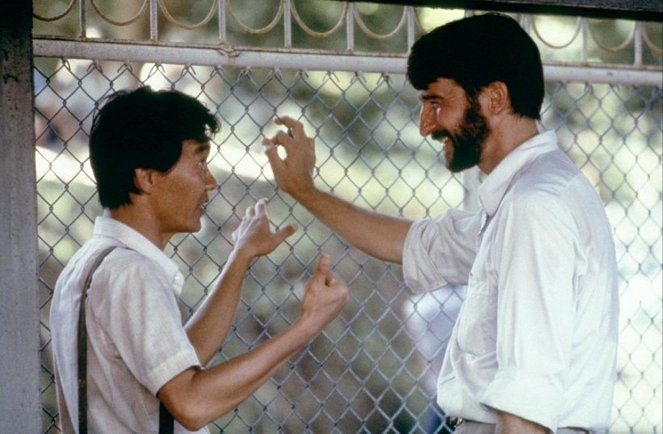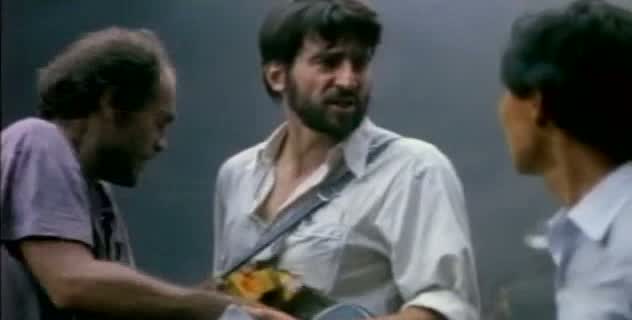Directed by:
Roland JofféScreenplay:
Bruce RobinsonCinematography:
Chris MengesComposer:
Mike OldfieldCast:
Sam Waterston, Haing S. Ngor, John Malkovich, Julian Sands, Craig T. Nelson, Spalding Gray, Bill Paterson, Athol Fugard, Mark Long, Patrick Malahide (more)Plots(1)
A photographer is trapped in Cambodia during tyrant Pol Pot's bloody "Year Zero" cleansing campaign, which claimed the lives of two million "undesirable" civilians. (official distributor synopsis)
Videos (1)
Reviews (9)
The Oscars went to the right people. The Killing Fields is an extraordinary film (not only) in the contemporary context with excellent camera work, a strong story, and high-quality casting. It is not the fault of the creators that some people lack context. At that time, it was about fresh events when the genocide of the Khmer Rouge on their own nation shook public perception worldwide. With the passage of the decades, a political film has become a historical film. But that is an inevitable process. The story is not encrypted in any way, and to understand its background it is enough to read some basic information about Cambodia in the 1970s. The film depicts the meeting and developing friendship of an American reporter with his local guide during the height of the Indochina War. After the fall of the pro-American regime, foreign reporters leave the country, but the native interpreter gets caught up in the machinery of the ultra-left regime and survives only with great effort and a good dose of luck. The drama cannot overshadow the fact that it is directed by Western filmmakers and intended for a Western audience - a purely Cambodian approach to the material would be even more depressing, darker, and more hopeless. But certainly also more atmospheric. Even so, the shows us a number of extraordinary scenes of war chaos and the suffering of prisoners in reeducation camps and subjects of the regime. Joffé shoots in a documentary style, and you simply have to believe his depiction of the landscape exposed to horrors. Mike Oldfield's impressive sound design is also worth mentioning. Haing S. Ngor, an immigrant and non-actor, a doctor by profession, won the Oscar for Best Supporting Actor for his role as Dith Pran. It is certainly arguable that American bombardment of the landscape is responsible for the extreme brutality of the Khmer Rouge. However, significantly larger and more systematic bombings in Vietnam did not lead to the radicalization of the local regime. The repulsive nature of the Khmer Rouge regime is owed in part to the fact that their leaders drew inspiration from Maoism and Mao's Cultural Revolution of the 1960s. Their profile also manifested through persecution by government authorities. Sihanouk was one of the typical oriental despots, and his secret police tortured and killed people on a whim. Overall impression: 90%.
()
At first it looks like just a great performance by Sam Waterston, but this film develops incredibly, until you realize that it's an incredibly powerful drama, both socially and humanly. The war is depicted without any embellishment, but we are not on the battlefield for most of the time. This makes the impact on the viewer even greater, who sees the outcome.
()
There is nothing difficult to understand about the premise of this film. The main motive is the friendship of a professional journalist who tries to map the events in Cambodia and a local who takes him around this mysterious and beautiful country. Unfortunately, at a time when the Khmer Rouge are trying to seize the government. A story that only real life could have written. When we add in the precise camera and the fact that the Khmers carried out purges that would make even Hitler green with envy, trust me it’s not a pleasant viewing experience. The first half lets you navigate yourself in the events, but the second shows true evil. It baffled me that anyone would participate in such atrocities. It was horrifying, not only visually in some scenes but also in terms of the psychology of certain characters. It’s been a long time since I spent two hours just gaping at some film in total stupor.
()
The Killing Fields is a movie where ambition simply oozes out of every frame. I’m not saying it’s bad. Especially when it’s in the hands of a director who knows how to avoid cheap sucking up to the Academy (although Lennon at the end was a step way over the mark). In the first half I couldn’t help asking myself why the story revolves round such an uninteresting, self-centered journalist when his gofer who he treats like shit is a hundred times more interesting. And luckily the filmmakers thought this too and in the second half they put him to the fore. And did well to do it in my eyes. Otherwise the scenes like developing photos in Spartan conditions, the video with Nixon’s speech and shots of the atrocities of the Khmer Rouge cut with Vincerò or lost in the killing fields are such powerful scenes that Roland Joffé has earned my greatest admiration. On the other hand, it doesn’t change the fact that I can see mistakes here. Which I can’t say about his next movie, however much I might want to.
()
Roland Joffé was at the peak of his strength in the mid-1980s, and this can very much be felt in The Killing Fields. The pathos and urgency imbued double story of an American journalist and his Cambodian colleague, left to the mercy of the Khmer Rouge in the 1970s, has a very clear moral message that, surprisingly, criticizes the traditionally empathetic American foreign policy far more than the incomprehensible Khmer Rouge fanaticism. The most powerful weapon of The Killing Fields is certainly not the fairly simple and straightforward story, but rather the atmosphere and perfect evocation of the time when the West was fleeing and the Reds were approaching Phnom Penh from the rice fields. One of Joffé’s directing highlights is a multi-layered reflection on events – a documentary played from a video, Sam Waterston's desperate eyes and Puccini's bitter aria Nessun Dorma. Powerful. So powerful that even Lennon's final "Imagine" cannot compete with the moment of awareness of absurdity, injustice, and hopelessness. From my perspective, the film could have been a few dozen minutes longer, because the passages from the Ankha camp are absorbing and extremely interesting. Unfortunately, it is also incomplete, too curt and sometimes unnecessarily tendentious (the truly "flash" episode with the baby boy). Although, similarly to Stone's Platoon, this is a literal and manipulative film, the theme and performance represent a delicacy that I had experienced in a spectator trance. The style in which Joffé involuntarily incorporates suffering and brutality into the story reflects some of the coldness and disinterest of the mass media... and that's why it sounds like a desperate cry. Certainly not a flawless film, but undoubtedly a powerful viewing experience for anyone interested in red totalitarianism.
()
Gallery (75)
Photo © Warner Bros. Pictures



Ads